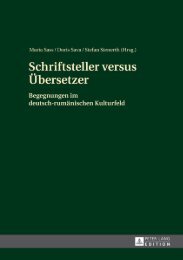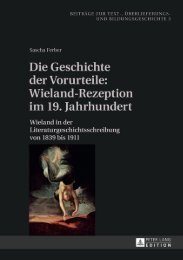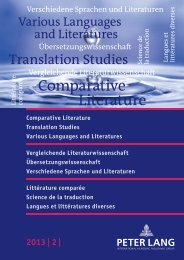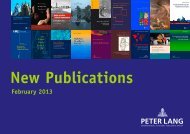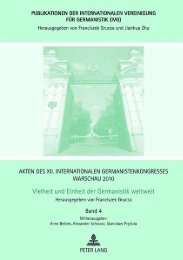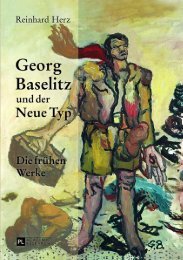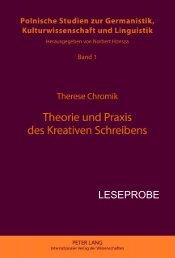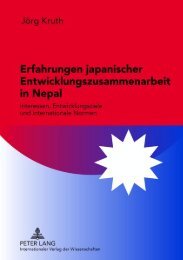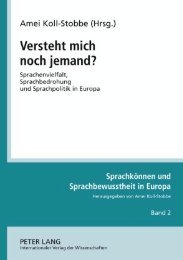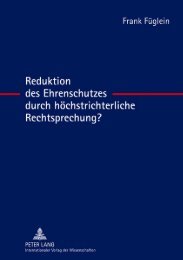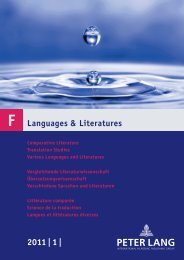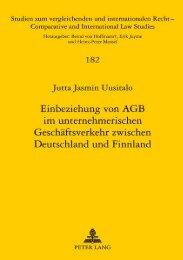Extract (PDF) - Peter Lang
Extract (PDF) - Peter Lang
Extract (PDF) - Peter Lang
You also want an ePaper? Increase the reach of your titles
YUMPU automatically turns print PDFs into web optimized ePapers that Google loves.
22 Fernanda Peñaloza<br />
unsettling. From my point of view, this is what Edward Said has called “the<br />
new global consciousness” which “connects all the various local arenas of<br />
anti-imperial contest” (62). Indeed, much of the developments in the vein<br />
of critique that has informed this editorial project are indebted to the fluid<br />
and subversive dynamics of resistance of such “arenas”. In this sense, the<br />
ethno-historical work of Walter Mario Delrío entitled Memorias de expropiación<br />
(2005) is a significant step towards such endeavours. Through mapping<br />
an oral history of the Mapuche, Delrío’s work – albeit not exhausting all the<br />
critical potential of his own theoretical framework – clearly demonstrates<br />
that there were indigenous collective counter-hegemonic discourses that<br />
challenge the dominant version of the region’s history.<br />
Another phenomenon worth mentioning is the vigorous interest in<br />
the region from Argentine and Chilean film directors and writers alike,<br />
who have produced a significant corpus of texts in which Patagonia is used<br />
as a setting for the stories they depict.28 Looking precisely at this phenomenon,<br />
Eva-Lynn Alicia Jagoe sets out to examine the intersections between<br />
history and textuality in the work of César Aira. Jagoe deconstructs the<br />
notion of South, strongly associated with the expansion of the frontier,<br />
and the violence exercised on the indigenous peoples. Jagoe argues that<br />
contemporary literary representations of the South are not only shaped<br />
by discursive configurations of Argentina’s own southern region, but also<br />
by a revisionist perspective on the territorial appropriation of the region,<br />
28 For example, this relatively recent literary production includes the works of Luis<br />
Sepúlveda (Mundo del fin del mundo, 1989; Patagonia Express, 1995), Eduardo<br />
Belgrano Rawson (Fuegia, 1991), César Aira (La Costurera y el viento, 1994), Sylvia<br />
Iparraguirre (La tierra del fuego, 1998; El país del viento, 2003) and Mempo Giardinelli<br />
(Fin de novela en Patagonia, 2000). In terms of the Argentine film production, the list<br />
of works is fairly extensive, so it would suffice to mention just a few: Héctor Olivera<br />
(La Patagonia Rebelde, 1974), Raúl Alberto Tosso (Gerónima, 1986), Alejandro<br />
Agresti (El viento se llevó lo qué, 1998), Juan José Jusid (Bajo Bandera, 1998), Pablo<br />
Trapero (Mundo grúa, 1999; Nacido y criado, 2006), Carlos Sorín (Historias Mínimas,<br />
2002; Bombón el Perro, 2005), Luis Puenzo (La puta y la ballena, 2004), Eduardo<br />
Mignona (El viento, 2005), Fabián Bielinksy (El Aura, 2005). Patagonia seems to be<br />
less important for Chilean directors in comparison to their Argentine counterparts,<br />
except for Ricardo Larraín (La Frontera, 1991), Adrián Wood (La fiebre del loco,<br />
2002), and Alex Bowen (Mi mejor enemigo, 2005).



